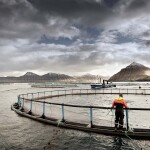Ahead of this week’s Food and Drug Administration meetings on genetically modified salmon, the CEO of AquaBounty defended the biotech firm’s controversial AquAdvantage salmon eggs for aquaculture producers.
The FDA has already determined that biotech firm AquaBounty Technologies’ AquAdvantage salmon is safe for human consumption, but has not issued final approval of the product. The FDA’s Veterinary Medicine Advisory Committee is reviewing data on the safety and efficacy of the technology, from 19 September through 20 September. On 21 September, the FDA will hold a public hearing on food labeling of GM salmon.
“The rest of the world looks to the U.S. for science-based regulatory processes. This application and method for review…will be a milestone event,” said Dr. Ron Stotish, CEO and president of AquaBounty, which started working on the regulatory process in 1995.
While environmental groups contend that the GM salmon may escape from aquaculture operations into the wild, Stotish says that is not the case. “These are land-based systems only. These fish can be grown closer to populated areas such as Minneapolis and Boston, which reduces the carbon footprint,” said Stotish.
If the GM salmon did somehow mix with wild salmon, it is infertile. “Our process that renders the fish sterile has been validated to 99.8 percent. They cannot breed with each other [because they are all female], and they cannot breed at all,” said Stotish.
Letters opposing AquAdvantage from U.S. Senator Mark Begich (D-Alaska) and others are “unfortunate,” said Stotish. “I don’t think anyone would say that the food needs of the U.S. could solely be met by wild salmon. Aquaculture addresses that world fisheries are stressed, because of overfishing,” he said.
Environmental groups’ oppositions to GM salmon are not based on fact, Stotish contends. “I have been disappointed by some of the things I have read by groups opposing this technology, because they have not read the 200-plus pages by the FDA summarizing the data. Many of the charges they have leveled are the old charges of ‘environmental disaster’ and ‘failure to prove food safety’,” said Stotish.
Groups are also concerned about how GM salmon would be labeled in the marketplace. The FDA does not require a separate label on a GM product “if the food is equal to its counterpart,” according to Dr. David Edwards, director of animal biotechnology for the Biotechnology Industry Organization (BIO).
“A label could be misleading. It would imply a difference [between GM salmon and regular salmon] that does not exist,” said Stotish.
After the FDA approves the salmon, AquaBounty expects to have product in the marketplace in about two years. “It will be shipped only to growers who have been approved by the FDA,” said Stotish.
All Aquaculture stories >





